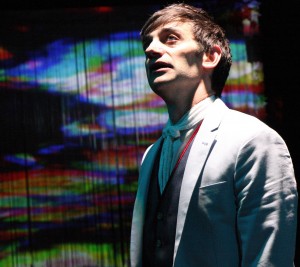Who doesn’t feel good when a posting on Facebook gets lots of “likes”? It’s a place where, when something momentous in your life happens, like a marriage, or a death, your FB friends—all hundreds of them—can give you a virtual hug. It’s also where the theater company Five on a Match culled the dialogue to create its production of Seen/By Everyone, directed by Kristin Marting at HERE Theater. Although the production feels fragmented—it’s nonlinear in both story line and dialogue—it does resonate. Primarily, it asks the question through the production itself: what is the effect of social media on our lives? It’s not an original question, and certainly not one that can be definitely answered, but it’s one worth considering from time to time.
The creators (Matthew Cohn, Amir Darvish, Meg MacCary, Enormvs Muñoz, and Jean Taher) use Facebook as a starting point, and every word in the show is from Facebook posts. The play, however, is not a head-on commentary on social media, but rather about the weight and depth of what is shared in this milieu. The writers focused on two major themes: relationships and death, and as in real life, conversation about these topics may be scaled down to their lowest common denominator, or fragmented. Also true to life is the pattern of everyday communication in which we respond to immediacy of information, as well as the tendency to meander down many different roads. No wonder we love social media so much: it mirrors our needs and patterns of communication so perfectly.
The play begins with a death, and picks up different fragments of different stories about relationships. One character, a perky but lost-looking character named Maggie (Alesandra Nahodil), dressed in a pleated white skirt and a crocheted blouse (costumes are by Oana Botez), sits at a bar. She says, “I made up a birthday so I felt justified getting wasted today.” Then, “I’m good at being homeless. But not that good.” The Bartender, dressed in tremendously tall lace-up platform boots, like the gatekeeper to a leather bar, addresses her with platitudes: “It’s OK to be alone,” he repeats over and over. Later, he gives her a list of all the things she can do to feel better: “write a story, read a new book or magazine, take a nap.” She seems unappeased. Later we learn why. She’s restless but not for the reasons we think. It’s a part of the play that remains a mystery until the end. However, in his attempt to soothe her, the gatekeeper/bartender (as usual) turns out to be the wisest one.
In some scenes, more naturalistic acting and narrative bring characters together. They gather at the bar, or at tall, round tables in the center of the space and gossip, fight, laugh, cry and over share. At one point, Rose (Katie Brustele) and Bernice (Jen Taher) exchange superficial tidbits. Bernice aptly launches into a diatribe about the elimination diet she’s doing in which she can’t eat any “gluten anything, no corn, soy, chocolate, booze, pork/beef/shellfish, no dairy/cheese/yogurt/egg, no sugar, maple syrup, agave, or honey.” It’s funny because it’s timely. Everyone knows someone, or knows of someone, who is consciously taking something out of their diet.
Without the development of characterization and a story line, however, it’s hard to get a sense of who these characters are. When Bernice accuses Fred (RollsAndre) of being cynical, we have to take her word. In this world, we have to take the other’s word, and there is some suggestion that social media nullifies our individuality. This is particularly implied when actors don masks with mirrored tiles, and line up. The masks make them faceless, and take away their individually, perhaps representative of the virtual FB community that is based on photos, disembodied words, and still images, rather than real interactive ones.
The experience of watching Seen/By Everyone can be disorienting if you’re not willing to leave your typical theatergoing road map of expectations behind. In the end, it offers a thought-provoking experience about the nature of what happens when important events, or everyday issues, are filtered through the lens of sharing vis-à-vis Facebook, a place where our identities are easily socially constructed, and where information, when isolated, can be disembodied.
Five on a Match’s world premiere of Seen/By Everyone runs through June 25 at HERE (145 6th Ave.; entrance on Dominick Street). Performances are at 8:30 p.m. June 16-19 and 22-25. Tickets are $25 and may be purchased online at http://www.seenbyeveryone.com/tickets/.










